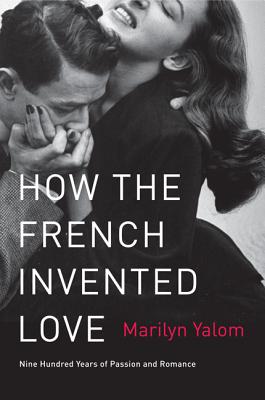Oh, how the French love love! For hundreds
of years, they have championed themselves as guides to the art de
l'amour through their literature, paintings, songs, and cinema. A French
man or woman without amorous desire is considered defective, like
someone missing the sense of smell or taste. Now revered scholar Marilyn
Yalom intimately examines the tenets of this culture's enduring gospel
of romance.
Basing her delightfully erudite findings on her extensive readings of French literature, as well as memories of her personal experiences in la belle France, Yalom explores the many nuances of love as it has evolved over the centuries, from the Middle Ages to the present. Following along, step-by-step, on her romance-tinged literary detective hunt, the reader discovers how the French invented love, how they have kept it vibrant for more than nine centuries, what is unique in the French love experience, and what is universal.
Read an interview with the author HERE.
Gerald says:
Basing her delightfully erudite findings on her extensive readings of French literature, as well as memories of her personal experiences in la belle France, Yalom explores the many nuances of love as it has evolved over the centuries, from the Middle Ages to the present. Following along, step-by-step, on her romance-tinged literary detective hunt, the reader discovers how the French invented love, how they have kept it vibrant for more than nine centuries, what is unique in the French love experience, and what is universal.
Read an interview with the author HERE.
Gerald says:
"As Tolstoi reminds us at the beginning of Anna Karenina, nobody watches "The Bachelor" or "The Bachelorette" to see
domestic bliss. Likewise, the misleadingly titled How the French
Invented Love by Marilyn Yalom is fascinating not because it presents a
more desirable love than is found in English and American
attitudes—with which the
author often contrasts her theme of love in French literature and
culture. The
author, rather, introduces us to 'French love' as a
fascinating prism of attitudes to erotic love, at times obsessively
jealous or cruelly indifferent, but never dull.
A popular
introduction to literature (for me, this book is more a study of a literary theme in cultural
context than a cultural study despite its occasional claims to the
contrary) must do two things : it must whet our
appetite for what we have not yet tasted and grant a context in well
known classics for exotic reading pleasures we may miss without a
guide. As to the former, I discovered minor treasures now on my
reading list. The 20th century lesbian writer Violette Leduc's
emotionally stunning description of women overcome by erotic exploration
in La Batarde is just one example. (Ever really experienced a kiss
like that?) As for the latter, the discussion of the intertextual
dialogue between French authors on the theme of older women and their
younger lovers enriched for me such classics as Dangerous Liaisons and Madame Bovary. Her discussions of the love letters of the worldly
Julie de Lespinasse, on one hand, and the writings of the Republican
women Elizabeth Le Bas and Madame Roland, on the other, are further
examples of how Yalom makes the contemporaneous literary works more
vivid for those of us with only a passing acquaintance with French
cultural history.
Despite
the title, the book is an 'entree' to a literary feast of passion and
heartbreak that I don't think will disappoint—strict Calvinists and
Puritans
excepted."


No comments:
Post a Comment